The Oriental Theatre, 2230 N. Farwell Ave., closed on June 21, but as you likely already know, it's not shuttered for good.
In June 2017, Milwaukee Film announced that it had acquired a 31-year lease for the theater – run for the past 40 years by the national Landmark Theatres chain – beginning this July.
Milwaukee Film, which officially took over the 91-year-old theater on Sunday, plans to run the triplex cinema year-round and expects to return to the kind of printed-calendar art-house format – with a blend of indie, classic, foreign and other films – that made the Oriental so beloved to many during the late '70s and 1980s.
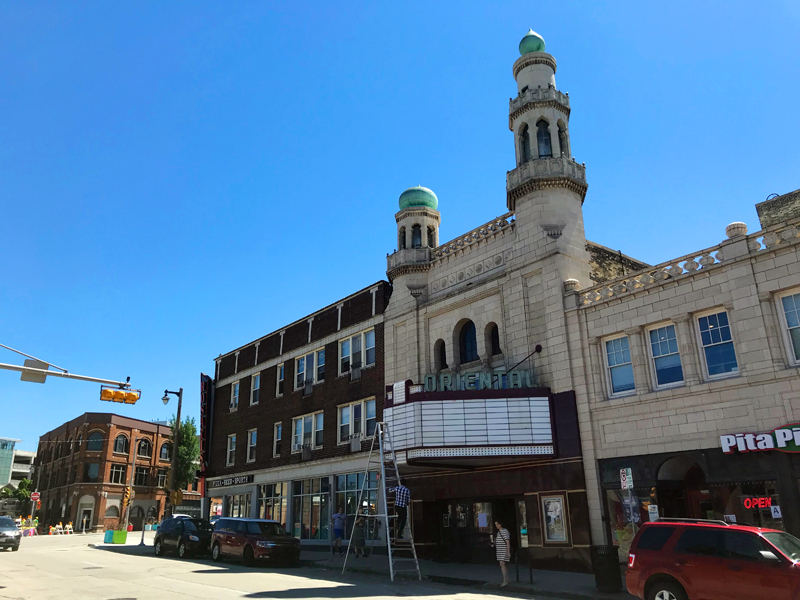
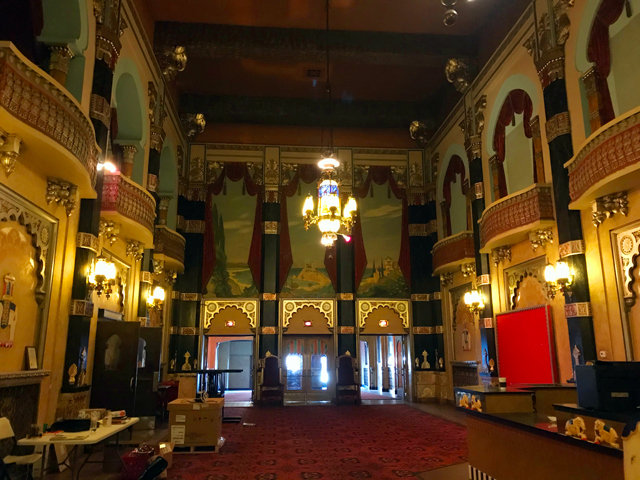
The theater's Kimball organ – originally installed in the Warner Theater, which is now being renovated into a new home for the Milwaukee Symphony Orchestra – was sold and recently removed.
Milwaukee Film plans to reopen the theater – designed by architects Dick & Bauer (who also drew the surviving Tower Theater on 27th and Wells a year earlier) – on Aug. 10, so it has a relatively small window of time during which it can complete the work it would like to do on one of Milwaukee's last remaining movie palaces.
"Welcome to the new beginning," says Milwaukee Film's Chief Marketing Officer Sara Meaney. "There is no better movie theater than the Oriental for Milwaukee Film's cinema home.
"This is the fulfillment of a 10-year dream for the organization. It solidifies our future and the ability to serve more people, to have more education screenings, to have more community engagement, to have more talkbacks and discussions, and the ability to actually turn our programming philosophy into a year-round offering. It's a pretty fantastic opportunity."
It's an opportunity that requires some work, Meaney adds.
"Walking in on Sunday and today, we were wondering what's still going to be here and now we have a better sense of what would be left behind and what we need to do and what kind of work has to get done.
"It is in incredible shape for the age that she is. There are spaces where, until the lights are up, you wouldn't even notice," she says. "You have to walk into the main house to see what we're dealing with. Somewhat more recently it's become clear that plaster on the ceiling needed more immediate work.
"It had been on the plan for renovation in the coming years, but it became more urgent that it be addressed right away for safety reasons. So that was a bit of a shift. That has moved up in the timeline."
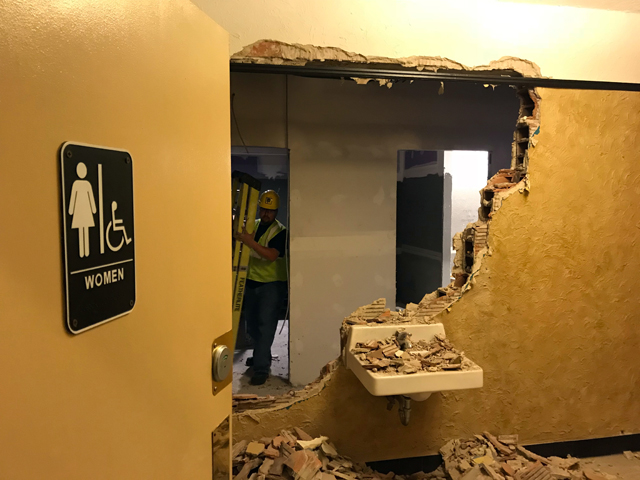
The list of major upgrades that Milwaukee Film is planning over the next three years – at a projected cost of $10 million – is ambitious and includes:
- Expansion of the first-floor and balcony-level restrooms. Restrooms for women and families will be added to the first floor immediately thanks to a an adjacent retail space that Milwaukee Film has leased (pictured above). Later, a men's room will be added to the balcony.
- New projectors and audio equipment – including 4K and 2K digital projectors and, in the main auditorium, archival quality 35mm and 70mm projectors – are being installed now.
- Fixing broken and missing plaster and water damage on the main auditorium's ornate ceiling, and painting as necessary, to restore the theater to its original glory, is already underway (see photo below).
- Restoring broken light fixtures and converting all lighting to energy-saving LEDs.
- Repairing and replacing seats, as necessary, in the balcony, as well as in the lower-level auditoriums.
- Adding acoustic treatments to improve noise cancellation and isolation in each of the three theaters.
- Replacing HVAC systems with quieter and more efficient units.
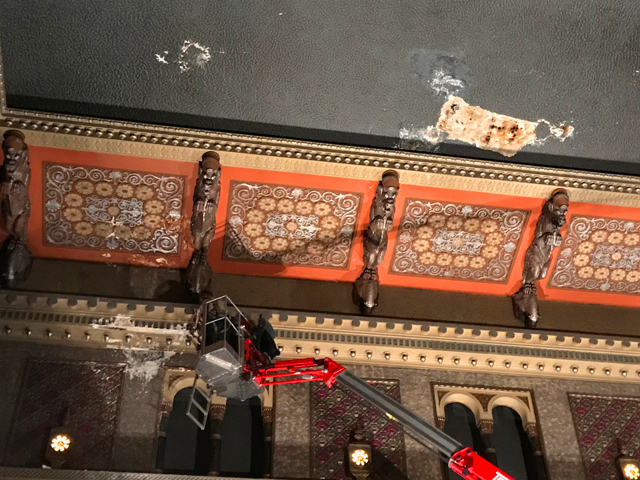
"Completing the first floor bathroom for women and renovating the men's is a very important first step and, of course, new and upgraded projection and sound is important for us to be able to reopen," Meaney says. "Creating ADA access to a lot of these things is also important.
"Some of those structural needs have required us to rethink what gets done when, but for the most part, the phases that have been planned are still the same."
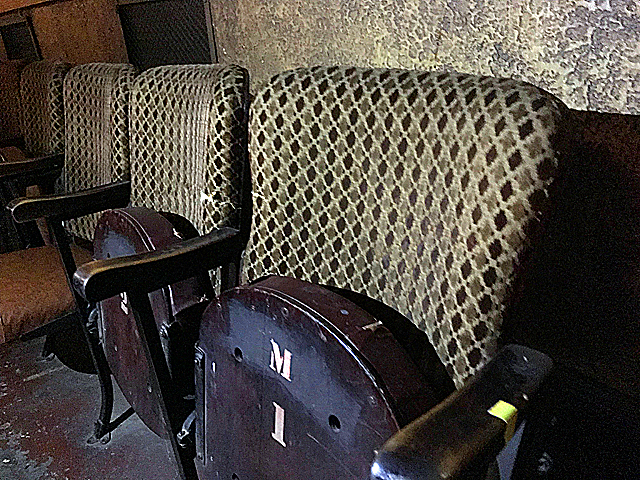
Meaney says the work being undertaken will be sensitive to the theater's treasured beauty and history.
"We're working with some great partners to make sure that all the details are not left behind," she assures. "There is nothing more important to us than preserving the experience in a film palace like this. The goal is to make all the things that people love about it not just as great but better.
"When you fall in love with this this theater, the goal isn't to change it; it's to fix it so it can stay that way for a lot longer."
Born in Brooklyn, N.Y., where he lived until he was 17, Bobby received his BA-Mass Communications from UWM in 1989 and has lived in Walker's Point, Bay View, Enderis Park, South Milwaukee and on the East Side.
He has published three non-fiction books in Italy – including one about an event in Milwaukee history, which was published in the U.S. in autumn 2010. Four more books, all about Milwaukee, have been published by The History Press. A fifth collects Urban Spelunking articles about breweries and maltsters.
With his most recent band, The Yell Leaders, Bobby released four LPs and had a songs featured in episodes of TV's "Party of Five" and "Dawson's Creek," and films in Japan, South America and the U.S. The Yell Leaders were named the best unsigned band in their region by VH-1 as part of its Rock Across America 1998 Tour. Most recently, the band contributed tracks to a UK vinyl/CD tribute to the Redskins and collaborated on a track with Italian novelist Enrico Remmert.
He's produced three installments of the "OMCD" series of local music compilations for OnMilwaukee.com and in 2007 produced a CD of Italian music and poetry.
In 2005, he was awarded the City of Asti's (Italy) Journalism Prize for his work focusing on that area. He has also won awards from the Milwaukee Press Club.
He has been heard on 88Nine Radio Milwaukee talking about his "Urban Spelunking" series of stories, in that station's most popular podcast.





